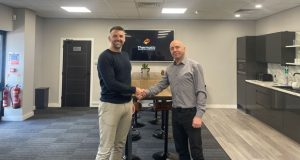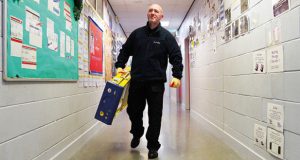SUSTAINABILITY
Chapman is a passionate advocate of sustainability in its broadest form, describing it as having three main elements:
- Environmental – the most recognisable sort of sustainability, that includes green buildings and managing waste
- Fiscal sustainability, particularly pricing, where it’s acceptable for suppliers to make a profit while still meeting their clients’ objectives
- People’s sustainability.
He explains: “These elements all go into our commitment in supporting Atalian Servest’s colleagues at all levels. The aim is about building a sustainable business and building future-fit partnerships. For instance, if a contract is not designed sustainably that means more fiscal pressure, which is when we can see an increase in mental health issues, stress, depression and people getting to breaking point. From a business perspective this may also result in unsustainable contracts, which fail as people leave or go sick. That’s why for me people, environment and financial stability all represent sustainability in FM.”
So how can the industry reduce risk and prevent a race to the bottom? According to Chapman, a lot of risk in the industry stems from not knowing enough about the client. He says Atalian Servest has carefully identified its core sectors as construction, corporate, distribution and logistics, education, leisure and tourism, rail, retail, public sector and manufacturing.

DIVERSITY IN FM
Another big passion for Chapman is diversity within the FM sector. According to the 2017 McGregor-Smith Review ‘Race in the workplace’, carried out by Baroness Ruby McGregor Smith, former CEO of Mitie, people from black, Asian and minority ethnic (BAME) groups are still underemployed, under-promoted and under-represented at senior levels. Chapman feels much more can be done to improve diversity in FM, helping to make it a career of choice for a more diverse cohort.
“People of all backgrounds need to be given more of an opportunity to progress,” he argues. “This is why we need to push to identify talent internally, and look at the governance of recruiting so that every role is advertised to encourage people to move up and progress. We also need to bring in people from other industries, sectors and walks of life who can start challenging and changing things for the better. My first recruit was from the dental industry, an ex-dental nurse who is now in a client development role because what I was looking for was drive and passion.”
He continues: “Our Chief Digital Officer, Lewis Richards, also hails from outside the industry [having joined from the world’s largest systems integrator, DXC, in 2018]. He has brought fresh eyes to how we handle data – how we can interpret it and how it can deliver something really worthwhile.
“For example, we have enhanced our time and attendance system to help improve data accuracy, communicate with frontline workers and acknowledge high performers. The system will enable recognition of frontline workers who are doing a really good job and identify people who might be struggling to fulfil their duties, with the aim of being able to support them more. The system is designed to help not only with payroll, but salary reviews and career opportunities, and help determine those who might benefit from furthering their skills and training.”
It’s something he’s backing because it ticks all the sustainable objectives, he says. “Good communication is of immense importance, because the main challenge in any FM company is a disconnect between head office and the front line.”
Entrepreneurial spirit is one of the company’s key values, which is being encouraged through a new initiative – the One Project. This is a Dragons’ Den-style competition that aims to allow colleagues at all levels and locations throughout the business in the UK and Ireland to become Atalian Servest’s next entrepreneur.
Explains Chapman: “The idea is to get everyone from frontline colleagues to our office colleagues looking at their respective disciplines – whether security, cleaning or catering – and come up with and share innovative ideas. We will then profile the best, help support their ideas and develop them through to implementation. In this way we can remind everyone in the business about our values and what they mean, while providing fresh ideas for our clients.”
THE FUTURE OF FM
For Chapman one of the ways to promote diversity in FM is to make it more appealing to school leavers and graduates by promoting the many vertical markets open to those who join the sector. “If you want to work in a certain sector, for instance the media as I did at the Guardian, you can satisfy the same ambitions in FM, but twin it with a well-paid job. I call it the wedding table chat, when people ask what do you do?
“When I said I worked for Arsenal, I would get more interest, based on the brand name. In reality I was working in business development for Arsenal. This is why we need to start looking at FM as disciplines and the contribution we make, with the outcome being that we help the workplace, the community and the environment, but through our many different roles. Not just the brand name of the organisation.
“Our primary purpose should be to have responsive passionate people within our businesses, and to create a culture where everyone, from the MD, business director, operations manager right through to the front line, convey these same principles. It’s time for genuine change, and it’s not just about replacing everyone on your board, but offering a way of communicating, listening and sharing all of the ideas coming through.”
(1) www.iwfm.org.uk/professional-development/training
(2) www.rics.org/uk/surveying-profession/join-rics/get-chartered-in-fm/
(3) The Social Impact of FM. RICS Strategic Facilities Management Case Studies, Series 5, October 2017
(4) www.fmj.co.uk/atalian-to-acquire-servest/





